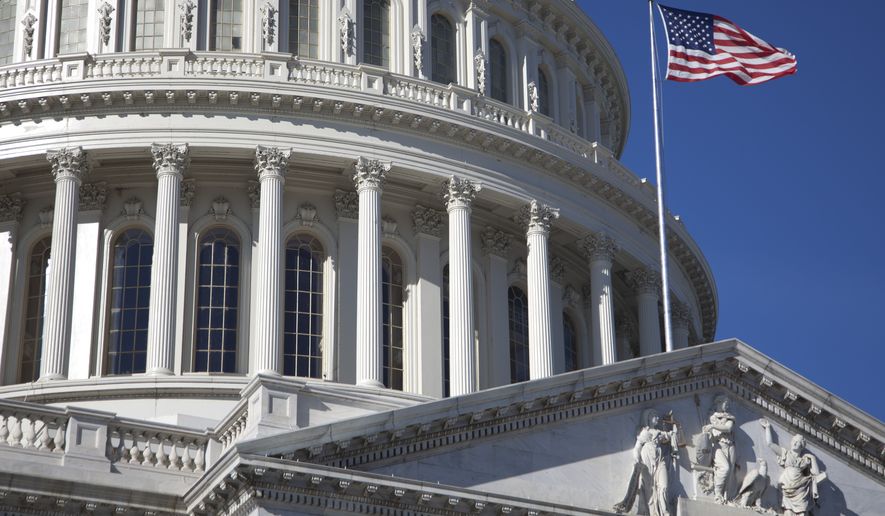A conservative public interest law firm sued the D.C. health exchange Wednesday for letting members of Congress get health insurance through their small-business portal even though each chamber on Capitol Hill employs thousands of people.
Judicial Watch says the District knowingly accepted documents from the House and Senate that attest to employing less than 50 people, clearing the way for it to use the SHOP exchange reserved for small employers.
“I don’t think that this is an honest mistake,” Judicial Watch President Tom Fitton said at a press conference. “Obviously Congress is not a small business.”
The plaintiff is D.C. resident Kirby Vining, who lives near Catholic University and claims he is injured as a taxpayer. The D.C. Health Benefit Exchange Authority uses tens of millions of dollars from the city’s general fund to run its exchange under the Affordable Care Act, so it should not be bending the rules, the lawsuit says.
“I’d like to see our laws abided by, or changed,” Mr. Vining, a retired federal worker, told reporters at the National Press Club.
In the lawsuit, Judicial Watch notes that members of Congress and staff members account for the bulk of enrollment on the small-business exchange. They say 12,359 of the 14,289 people who enrolled in the small-business exchange through Sept. 9 came from Congress, underscoring their reliance on the District.
SEE ALSO: Obamacare website won’t reveal insurance costs for 2015 until after election
The D.C. exchange did not immediately comment on the lawsuit Wednesday.
Under the health care law, the federal government may only offer health coverage to members of Congress and certain staff members through an Obamacare exchange.
Sen. Chuck Grassley, Iowa Republican, crafted the language to see if Democratic architects of the law would be willing to experience what millions of average Americans would, since the law requires most people to hold insurance and the exchange was the most affordable route to acquiring it. Democrats took him up on the challenge and agreed to the provision.
But the Office of Personnel Management said last year that denizens of Capitol Hill could keep an employer subsidy that covers up to 75 percent of their premiums if they sign up through the D.C. small-business exchange.
The move caused some Republican lawmakers and observers to accuse Congress of “exempting” itself from its own law. The Judicial Watch lawsuit adds a new wrinkle, in that it goes after the D.C. exchange instead of individual members or the Obama administration.
“The District of Columbia should not be a party to this fraud,” Mr. Fitton said.
SEE ALSO: Pro-life groups protest government funded abortions
Also this week, lawyers on behalf of Republican Sens. Ted Cruz and John Cornyn of Texas have filed a brief in support of a lawsuit that argues Obamacare violates the U.S. Constitution’s requirement that all tax bills originate in the U.S. House of Representatives.
“While it may seem odd that sitting Senators would speak out in support of enforcing restrictions on the authority of their own chamber to initiate bills for raising revenues, their duty is first and foremost to ’support and defend the Constitution,’ not to aggrandize power for themselves and their Senate colleagues,” lawyers said in the paperwork filed Tuesday.
A three-judge panel of the U.S. Circuit Court of Appeals for the District of Columbia had ruled over the summer that the Obamacare tax was “incidental” to the primary purpose of the Affordable Care Act, so it isn’t a revenue-raising measure as envisioned by the Constitution.
The origination issue had been in doubt after the Supreme Court’s decision two years ago saying that while the law’s individual mandate wasn’t allowed under Congress’s powers to control interstate commerce, it was a valid exercise of Congress’s taxing power.
Since the key language of Obamacare came from the Senate, some opponents then said it violated the “origination” requirement in the constitution that revenue-raising measures begin in the House.
The two senators requested a rehearing by the full appellate court.
• Tom Howell Jr. can be reached at thowell@washingtontimes.com.
• David Sherfinski can be reached at dsherfinski@washingtontimes.com.




Please read our comment policy before commenting.